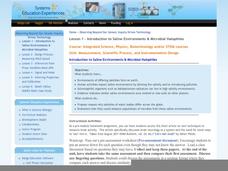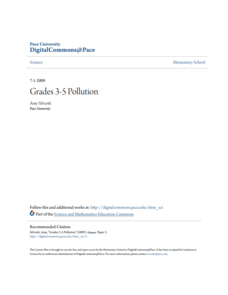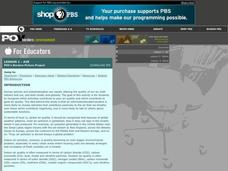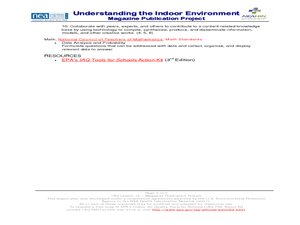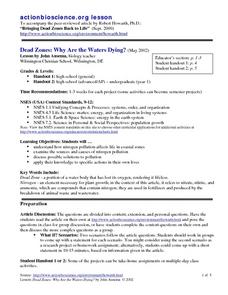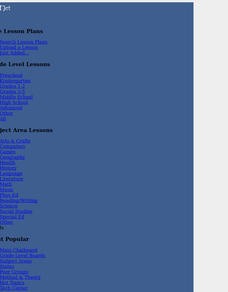Rustle Leaf
Tell Someone About Earth Day
Celebrate Earth Day by spreading the word of conservation. Teach children ten easy ways to help preserve the Earth and share this knowledge with others by sending e-cards and printable cards to loved ones. Extend learning about the...
Marine Institute
Water Pollution
Sixth graders investigate the various types of pollutants found in water and ways to help prevent water pollution. Through a hands-on experiment, students create samples of polluted water by mixing water with vegetable oil, dirt, and...
National Institute of Open Schooling
Radioactive Pollution
Radioactive pollutants can enter the body through ingestion, inhalation, absorption, or injection. The last lesson in a series of 36 introduces pupils to radioactive pollution. They study its sources, both natural and man-made, its...
Curated OER
Smogasbord
When your environmental or earth science class is studying air pollution, you will want to take the time to go over this resource. Pupils peruse the history of air pollution regulations and examine outstanding diagrams of what...
Discovery Education
Fuss About Dust
Dust is everywhere around us; it's unavoidable. But what exactly is dust and are certain locations dustier than others? These are the questions students try to answer in an interesting scientific investigation. Working independently or...
ARKive
Human Impact on the Environment
Study the ways that humans have impacted the environment, particularly the spread of plastic waste. After watching a short film about the Laysan albatross population, learners complete a worksheet and research other ways that plastic...
Curated OER
Pollution Research
Fourth graders explore pollution. They conduct preliminary research on pollution using the internet. Students share their findings with the group. They work with a group and create lists of facts on pollution.
Institute for Systems Biology
Introduction to Saline Environments & Microbial Halophiles
If you do not mind wading through unrelated headings (This is not for a physics or STEM course, as it states.) and content (The lesson opens with an article about neurology, not halophiles.), then you will find a valuable resource on...
Curated OER
Air Pollution and Asthma
Eleventh graders consider air quality. In this environmental stewardship lesson plan, 11th graders consider the impact of air pollution on asthma and identify ways that they can work to reduce air pollution.
Curated OER
Revised: Adventures in Earth Day: Why Do We Care About Our Environment? - Biology Teaching Thesis
To describe the ecological and aesthetic importance of the Potomac River, Middle schoolers name the ways in which the river's values are jeopardized and explain the purpose of Earth Day. They write a response to a newspaper article in a...
EngageNY
Comparing an Author’s Presentation of Ideas: “Rachel Carson: Sounding the Alarm on Pollution”
It's all in the presentation. Readers take a look at author's presentation in the article Rachel Carson: Sounding the Alarm on Pollution. Scholars work together to complete a Comparing
and Contrasting Authors’ Presentation graphic...
Pace University
Pollution
Over the course of 10 days, scholars take a pre-assessment to place them in one of three leveled groups. Whole-class and in small groups, pupils take part in read-alouds, field trips, hands-on activities, and complete learning contracts...
Curated OER
Environment: Endangered Mammal Project
Young scholars research different mammals and create illustrations and narratives about them. Working individually or in small groups, students compose their rough drafts prior to creating their posters or dioramas. Young scholars...
Baylor College
Bio Build-up
Trace pollutants through the environment in the seventh lesson of this series on the science of food. Looking at a picture of the plants and animals in an aquatic ecosystem, learners use dot stickers to represent harmful chemicals as...
Curated OER
P.O.V.'s Borders Picture Project: Lesson 1 - Air
Take photos of human activities that impact air quality. Collaborative groups present one of the photographs, identifying how the activity contributes to air quality and what can be done to minimize the impact. As one in a series of...
Alabama Learning Exchange
Make a Difference!
We are very dependent upon other life forms around us to survive. Here, scholars explore relationships in the ecosystem with the help of Auntie Litter and the pollution patrol. They imagine a world without grass, making connections to...
Curated OER
Indoor Environment: A Magazine Publication Project
Students demonstrate knowledge of Indoor Air Quality by creating a class magazine. A link to order a free Action Kit from the U.S. Environmental Protection Agency is provided so teachers can build background knowledge. Performance...
Curated OER
The Environment and You
First graders examine the human environmental impact and discover ways to lessen effects. They create a pollution damage flow chart and write down what they think Mother Earth might say. They create inventions from recyclable materials.
Curated OER
The Water Cycle and Sources of Pollution
Students make an island that has a construction site on it. They spill siulated pollution and trash on top of the island and then water it to simulate rain. They will observe how the rain washes dirt, sand, and pollution off the island...
Curated OER
Dead Zones: Why Are the Waters Dying?
Students investigate the effects of pollution on marine ecosystems. They read and discuss an article, identify the effects of pollution on marine life, conduct research on local nutrient pollution, and conduct local water quality studies.
Virginia Department of Education
Changes in Ecosystems
How does water pollution affect the environment? Provide your class with the resources to answer this question as they learn about eutrophication and ecosystem changes. Over two weeks, they simulate the effects of pollution on the...
Curated OER
Pollution
First graders identify and discuss different kinds and sources of of pollution. They explain why it is important to keep the environment free of pollution. They make a poster depicting the dangers of pollution and make litter boxes.
Curated OER
People and the Environment
In this environment worksheet, students look at how different human actions can cause pollution and how the pollution effects the environment. This worksheet has 6 short answer questions.
Curated OER
Polluting the Environment
Fourth graders construct mini-ecosystem, pollute the ecosystem, observe, collect, and record data on the effects of these pollutants on their ecosystem, organize data on spreadsheets, create graphs, and design presentations to share with...
Other popular searches
- Urban Environment Pollution
- Pollution and the Environment
- Pollution in the Environment
- Pollution and Environment
- Pollution Environment









